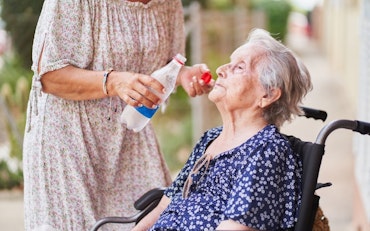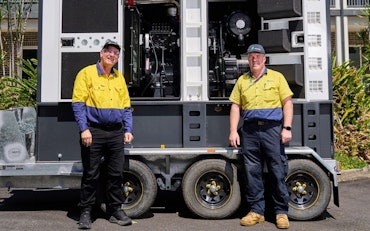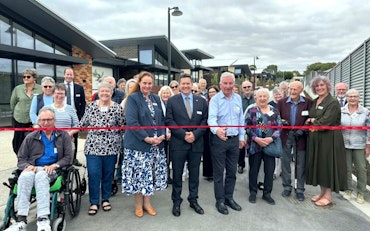ROYAL COMMISSION: Aged care discrimination towards LGBTIQ and ATSI people
The last two days of the Royal Commission into Aged Care Quality and Safety involved statements from people who have experienced discrimination in aged care and listened to examples of good diversity care being provided to special needs groups by providers.
![<p>Malloy was discriminated against for her sexuality while volunteering at an aged care facility. [Source: Aged Care Royal Commission]</p>](https://agedcareguide-assets.imgix.net/news/articles/news/articles/Screen-Shot-2019-10-10-at-3.38.40-pm.png?fm=png&format=auto&w=550&q=65)
Malloy was discriminated against for her sexuality while volunteering at an aged care facility. [Source: Aged Care Royal Commission]
On Thursday, one witness, who was identified as Malloy, gave direct evidence to the Commission about her own discrimination experiences as a member of the Lesbian, Gay, Bisexual, Transgender, Intersex and Questioning (LGBTIQ) community and how this discrimination affected her volunteering and life in aged care.
Malloy explained that over her entire life, she has received discrimination for her sexuality, including from family, friends and colleagues, so the move into a retirement village made her nervous.
She has been volunteering for a long term in an aged care facility in Adelaide, providing companionship to lonely and depressed residents who were not visited often.
While the volunteering was received well by the involved residents, the nurse manager of the facility repeatedly bullied Malloy because of her sexuality.
Eventually, the nurse manager stopped Malloy from volunteering at the aged care facility citing complaints from residents.
The manager refused to show proof or evidence that complaints were made against Malloy, so she had to get help from an aged care advocate to sort out the distressing situation.
While Malloy was able to continue her volunteering after compromising with the nurse manager, she said the whole situation was awful and brought back memories of the ridicule she experienced as a child.
“I believe that complaints were never actually made and that it was the nurse manager’s personal issues with my sexuality that caused her attack. This is plainly discrimination and it should not be allowed to occur. I am not aware of any consequences to the nurse manager for the way she treated me,” says Malloy.
“I think LGBTIQ people should be treated with respect and people should be able to be themselves without having to hide their sexual orientation.
“I feel that LGBTQI elders are not speaking up about issues they are experiencing in aged care. Due to LGBTIQ elders not speaking about the discrimination they are experiencing, it may seem to other people that there is no issue.
“I believe there should be mandatory training on caring for LGBTIQ elders. This training should be for all staff at all levels of these organisations and facilities. Steps should be taken to make sure LGBTIQ people, particularly elders who have often suffered through a life of non-acceptance, are made to feel welcome and safe in residential aged care facilities.”
Trauma keeps ATSI people scared of aged care
On the last day of the Commission around diversity in aged care, Chief Executive Officer (CEO) or Aboriginal Community Elder Services (ACES), Moreen Lyons, explained the issues Aboriginal and Torres Strait Islander (ATSI) people face in the aged care system.
ACES is dedicated to providing cultural environments to ATSI people, who are more likely to enter aged care at a vastly lower age than the general population.
Some of the hostel and residential aged care services have intakes of ATSI people from aged 45 years old and up, and sometimes they take in younger ATSI residents.
Ms Lyon says ACES is meeting a huge demand for ATSI people requiring care, especially for those with past trauma.
In Ms Lyons opinion, there is a huge demand for allied health and psychiatric services for ATSI people in aged care.
“They typically have experienced considerable childhood and later in life trauma, it is very much connected to intergenerational trauma of survivors of genocide,” Ms Lyons explains through tears.
“There is a multitude of traumas in that process. Those traumas are contributors to chronic health issues earlier or later in life, depending on the circumstances they have lived through.
“We have people in the higher needs care that are now surviving the stolen generation that didn’t know they had family…
“They got turned out from these institutions at 12 with nothing in their pocket with no family to look after them, which I can’t understand why anyone would do that.
“For many of our residents, ACES is probably the first taste of a routine of care, genuine care, and support. A safe cultural and spiritual environment where they know they won’t be turned out and won’t be hurt or harmed, and that has tremendous healing.”
ATSI people are ageing quicker than the general population with physical and chronic health issues a driver of that. Most of these health issues are a result of trauma.
Indigenous Australians are three to four times more likely to develop dementia, and there are links to childhood trauma being a cause.
Ms Lyons says that ACES believes 45 years old is an acceptable age to take an ATSI person into care, however, she thinks there should be flexibility available to accept younger people if need be.
Counsel Assisting asked whether it’s important for the aged care workforce in aged care facilities to understand Aboriginal values, with Ms Lyons saying it was incredibly important.
Ms Lyons explains, “It’s absolutely fundamental because it is a part of how they measure if it is safe or not, and whether they can relax and be accepted.
“There is still very high instances of discrimination and racism prevalent. I have had residents come back really distressed from quite blunt interactions with culturally insensitive providers.”
Ms Lyons finished her time at the Commission explaining that My Aged Care is not accessible for ATSI people, and that ACES specifically has more staff in their aged care facilities because it is necessary for good care of ATSI people.
The Royal Commission hearings will be continuing on a different topic next week, running from October 14-16, focussing on the aged care workforce.










